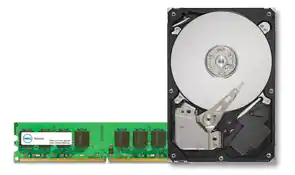- Performance: SSD performance is influenced by the interface or protocol chosen – 2.5” SATA drives or M.2 form factor PCIe drives which use the NVMe protocol. PCIe NVMe drives are substantially faster than 2.5” SATA SSDs and HDDs. PCIe NVMe drive performance can also vary based upon the type of NAND flash used and the number of PCIe lanes supported by the M.2 form factor. SSDs should always be chosen as the boot drive.
Hard disk drives (HDD) come in 2.5” and 3.5” form factors. HDD performance is influenced by the speed of the drive measured in revolutions per minute (rpm) and the drive interface i.e. SATA or SAS. 2.5” SAS drives (available on Precision 5000/7000 Towers and Rack with MegaRAID controllers) run at 10,000 rpm or 15,000 rpm vs the typical 7,200 or 5,400 rpm of SATA hard drives. Higher rpm equals higher performance. - Capacity requirements: More gigabytes (GB)/ terabytes (TB) means more capacity. Presentations, videos, spreadsheets and photos take up much more space than word processing documents and emails and will require drives with more capacity. SATA hard drives are great for maximum capacity (up to 12TB on 5000/7000 Series) and can arranged as part of a RAID set, to create a single, very large volume as seen by the operating system, NVMe SSDs can also be arranged together in a RAID set to provide higher capacity with this very fast storage.
- The importance of the data: Sensitive data such as customer information, financial records and medical history can be better protected by a full-disk encryption (FDE)/Self-encrypting Drives (SED): These help keep your data safe by using powerful, hardware-based encryption without a negative impact on performance. The encryption engine is built directly into the drive controller with all encryption done at the full speed of the drive. On SED drives even the password is encrypted, so your data has an additional layer of protection whether the drive is in the system or on its own if stolen.
- Durability: Hard drives have moving parts, making them vulnerable to certain impacts, vibrations and other movements that can lead to a crashed hard drive. The durability of hard drives is measured as MTBF (meantime between failure). Solid state drives help protect against impacts and can reduce the risk of failure. The durability of an SSD is called its endurance and is measured as TBW (total amount of terabytes that can be written to an SSD over its lifetime). If you are usually on the go, work in the field or often run through airports, with your mobile workstation, you should choose a solid-state drive.
Solid-state Drives (SSDs): Dell M.2 PCIe NVMe SSDs and 2.5” SATA SSDs offer exceptional performance vs 7200 rpm HDDs1 and added durability2 and reliability unmatched by standard hard drives. SSDs are virtually silent and give out less heat helping create a better experience. PCIe drives with the NVMe protocol have up to 4 times the theoretical bandwidth of SATA SSDs
Dell Offers 3 Classes of SSD's a mainstream offering (Class 20 SATA or Class 40 PCIe NVMe) and a high performance offering (Class 50 PCIe NVMe)
Hard Disk Drives (HDD's): Dell Precision products offer a full range of HDDs, including FIPS-certified encrypted HDDs. Dell’s fast response free fall sensor technology can sense if a system is falling and "park" the heads in a safe position to help protect the drive from failure and potential data loss. By having this technology in the system, these Dell drives can detect and react quickly to protect your data.
PCIe based Add-in-Cards: Taking advantage of the latest M.2 SSD form factor, you can populate the Dell Ultra-Speed Drive PCIe cards with up to 2 or 4 PCIe NVMe drives of incredibly fast storage. The Ultra-Speed cards and M.2 PCIe NVMe SSDs are also available as kits than can be ordered after your system purchase, to update or expand capacity.
| If you want ... | Choose ... |
| A storage solution designed for High Capacity | A traditional Hard Drive (HDD) |
| A storage solution designed to be Quiet, Fast, Reliable | A Class 20 SATA SSD; up to 5x faster than HDD – this is the mainstream volume offering |
| A storage solution designed for fast performance, higher capacity, and improved power efficiency | A Class 40 PCIe SSD; up to 15x faster than HDD – this is the mainstream volume PCIe offering |
| A storage solution designed for High Performance and Endurance | A Class 50 PCIe SSD: up to 21x faster than HDD |


